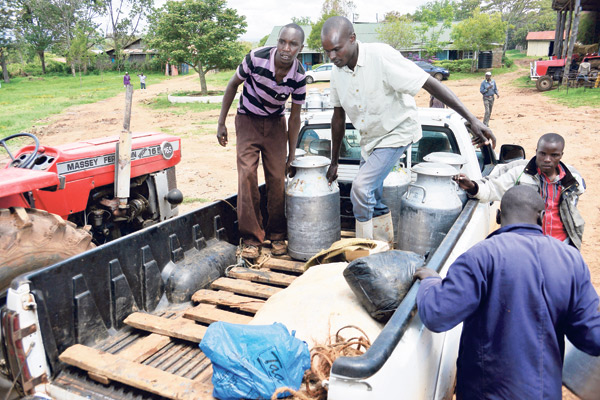As you approach Eldama-ravine town, Baringo County, from Kabarak, you cannot miss Sabatia Farmers’ Cooperative Society building.
The society runs a milk bar, a milk processing plant and a dairy meal manufacturing outfit.
Chairman Dancun Langat says they sell the feeds to members and other farmers. The cooperative, the biggest farmers’ outfit in the town, is an example of how farmers can benefit by coming together.
At the plant, its 1,500 members buy dairy meal in packs of 10kg at Sh300, 20kg at Sh580 and 70kg at Sh1,900. In agrovets, a 70kg bag of dairy meal goes for Sh2,350 while a 10kg bag Sh350.
According to Langat, most farmers in the region have been depending on free-range grazing.
However, advancement in farming technologies coupled with increased knowledge has made most of them embrace zero-grazing, thus, creating demand for feeds.
“However, counterfeited dairy meal as well as high cost of feeds in shops have caused headaches to many farmers,” says Langat, adding that their low prices have greatly helped members.
Until late last year, farmers would struggle hard to get dairy meal because the society had not started processing the feeds. However, Sh3.9m loan from Kenya Commercial Bank helped to revive its dairy meal manufacturing plant which had not been in operation since early 2013.
The cooperative pays Sh128,000 a month to the bank and will do so for the next three years.
BOOSTING THE PROJECT
Asked how they will sustain the project after repaying the loan, Langat says they will spend the money that was being channelled to clearing the loan towards boosting and sustaining the dairy meal project.
“We ensure our feeds’ protein content is much higher at between 18 to 19 per cent as compared to others which stand at 16 per cent,” says Langat
Besides, farmers pay for feeds and other products from the society’s agrovet shop in installments with deductions from their milk sales.
At the back of the society’s building, there is a kitchen where Seeds of Gold team finds 200 litres of milk boiling. The society does not have a boiler, at least for now, and the employees have to boil milk manually with firewood in sufurias. “We manufacture 300 litres of sour milk, which we package and sell locally as well as in neighbouring Kabarnet and Sigor towns”
In a milk bar adjacent to the sour milk processing area, an average of 2,300 litres of milk is sold at Sh50 each daily.
“The rest of the milk is sold to Brookside Dairies at an average of Sh38 per litre,” says Langat. As a marketing agent, the cooperative charges farmers 18 per cent of their sales, money which goes to paying salaries to its 28 employees and cater for other expenses.
NO REGRETS
Walter Kandie, a dairy farmer from Kapiyech village, says he has no regrets being a member of the cooperative. Before he joined, the farmer as many others, said he struggled with expensive feeds and low yields. He lives 10km from Sabatia cooperative but he now delivers milk at a collection point 200 metres from his home.
He also enjoys credit facilities for animal feeds and has attended various trainings, courtesy of the society.
James Too, the manager of the milk centre, says that farmers deliver about 3,000 litres of milk per day.
“The deliveries go up to 8,000 litres if pasture production improves,” says Too, who turned down a request to know how much money they make in a month.
Recently, the KCB Foundation offered interest free loans to Sabatia society members who would like to buy high quality dairy cows at Sh200,000 each.
In a week, 21 farmers have registered and the number is likely to rise as the information continues to be shared.
To join the cooperative, one needs Sh500 registration fee, and then they start delivering milk. “Those who do not have cash can deliver milk and their registration fee is deducted from the first month’s payment.”
Koibatek District agricultural officer Richard Kamuror says cooperatives are the best ways through which farmers can empower themselves.
“Farmers can easily do value addition on their produce and seek for markets at a standardised rate thus increasing profit.”








